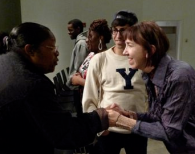New York City immigrant groups and communities joined together to watch Not In Our Town: Light in the Darkness during Immigrant Heritage Week in late April.
The film was screened eight times across the city—in Queens, Chinatown, Brooklyn and the Bronx—sparking discussions about how to address the challenge of hate and bias.
At the Bronx Museum, NYC Commissioner of Immigrant Affairs Fatima Shama led the post-screening discussion with filmmaker and executive producer Patrice O'Neill. The event was attended by members of the Bangladeshi, West African, African-American, and Puerto Rican communities. Three groups at the event pledged to hold other screenings in the Bronx in the coming month.
light in the darkness

A Latina resident of Phoenix stepped up to the microphone, her voice cracking, nearly tearful.
“Why do they hate us?” she began. “That’s what my seven and eight-year-old niece and nephew—who have been in this country all their lives—ask me when they hear what people say about immigrants here in Arizona.”
The woman spoke to Patchogue, NY Mayor Paul Pontieri in a packed theater in February, following a screening of Not In Our Town: Light in the Darkness. Pontieri was sharing his experience during the aftermath of the hate crime killing of Marcelo Lucero and attacks on local immigrants in 2008. He spoke with compassion and conviction about the need to dampen dehumanizing rhetoric against immigrants, most especially because of its effects on children and young people. Pontieri was formerly a middle school assistant principal.
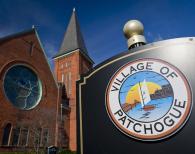
By Paul Pontieri, Mayor, Incorporated Village of Patchogue
Mayor Paul V. Pontieri
At the 2011 Congress of Cities and Exposition in Phoenix, Mayor Paul Pontieri of Patchogue, N.Y., helped lead a workshop featuring segments from the PBS documentary Not In Our Town: Light in the Darkness, about the community response to an anti-immigrant hate crime killing in his town. The session, sponsored by NLC’s Municipal Action for Immigrant Integration program (MAII) launched a productive conversation with mayors and other city leaders about how to effectively address these complex challenges. Mayor Pontieri will appear at a film screening and discussion on February 8, 6:30 p.m. at Scottsdale Community College Performing Arts Center in Scottsdale, Ariz.
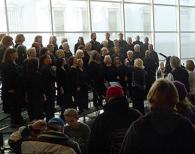
Not In Our Town returned to Sacramento. In this city, we have documented communities coming together after synagogue arsons and Sikh shootings, and yesterday we were invited to share our most recent PBS film, Not In Our Town: Light in the Darkness, as part of the city's Martin Luther King Jr. Day celebrations.
MLK Day: Lift Every Voice was sponsored by the Crocker Art Museum and included a music-infused celebration.
200 gather for screening of Not In Our Town: Light in the Darkness at Sacramento's Crocker Art Museum.
Not In Our Town Executive Producer Patrice O'Neill
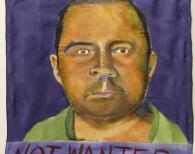
“As I watched this documentary unfold I found myself riveted to the screen. It deals with social issues that I hold dear, specifically how central a community can be for making changes. It restored a feeling of optimism in me to see how a community coming together can turn a frightful act into a hopeful new beginning.” — Berenice Pliskin, Artist After viewing Farmingville, a 2004 PBS documentary about the hate-based attempted murders of two Mexican day laborers on Long Island, New York artist Berenice Pliskin felt moved to depict the town’s conflict as a vibrant painting.
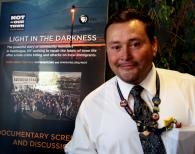
One highly motivated and persistent person can help spark significant action in a community.
That's what Jesse Castaneda did in Silicon Valley. Because of his actions, key civic leaders in Santa Clara County renewed their commitment to prevent hate crimes. Since August 2011, Castaneda has been screening the film Not In Our Town: Light in the Darkness with civic leaders, teachers and immigrant groups. While many leaders in the area have been aggressive about addressing hate crimes, the new film, and Jesse's persistence helped shed light on the dangers of anti immigrant violence, and encouraged people to come together to find new solutions.
Although the activist works full-time in health care, is chair of an immigration reform coalition, and is expecting his first child in a few months, Castaneda has found the time and energy to use the latest Not In Our Town film to help galvanize his community.
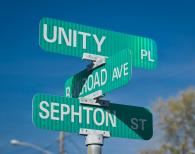
Mayors of neighboring communities, Sid Espinosa of Palo Alto and Jac Seigel of Mountain VIew, collaborated in hosting a screening of Not In Our Town: Light in the Darkness in Los Altos Hills, Calif. Local lawyer and avid film critic James Quillinan shares his review of the film from a screening in which more than 50 supporters attended.
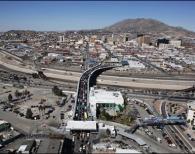
The Juarez Mountains provide an idyllic backdrop to the view of downtown El Paso, Texas--yet for many residents, it is clear that the increase of violence along the U.S.-Mexico border has created a stark divide between two cities located just a few hundred feet apart from one another.
Separated only by the Rio Grande river, El Paso and Ciduad Juarez, Mexico, historically have been treated as one community by residents on both sides.
The Santa Fe Bridge links Ciduad Juarez, Mexico (Bottom) and
El Paso, Texas. Source: Katu.com
We are trying to make our work better and to help funders understand the impact of what we do. This survey, of course, is totally voluntary. However, we would really appreciate your responses and comments. If any question is uncomfortable, please feel free to skip it. Thanks, in advance.Note: Your e-mail and phone number will not be shared with anyone or any group, either for money or for other contact purposes. Our main interest is to understand how well we are reaching different groups, what you think of our efforts, and your suggestions about how we can do better. Loading...

Communities have been screening Not In Our Town: Light in the Darkness across the country, but a legal nonprofit brought the film close to home. LatinoJustice PRLDEF first screened the film at their Manhattan offices on Sept. 20 and at the Touro Law Center on Long Island on Oct. 3.
